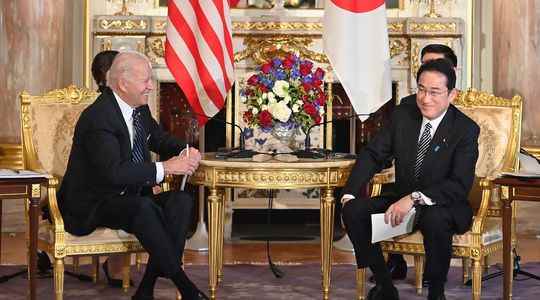IPEF, for Indo-Pacific Economic Framework. Here is the name of a new economic partnership in Asia-Pacific with 13 first participating countries, as announced this Monday, May 23 in Tokyo by US President Joe Biden. The Economic Framework for IPEF is not a free trade agreement, but provides for further integration among its member countries in four key areas: digital economy, supply chains, green energy and climate change. against corruption.
“The United States and Japan, together with 11 other nations, will launch the Indo-Pacific Economic Framework,” Joe Biden said during a press conference with Japanese Prime Minister Fumio Kishida. “It is a commitment to work with our close friends and partners in the region, on the challenges that matter most to ensuring economic competitiveness in the 21st century,” added the American president.
The IPEF initially comprises a total of 13 countries. In addition to the United States and Japan, there are India and Australia – the four states making up the diplomatic format of the “Quad” which will meet on Tuesday May 24 in Tokyo – as well as Brunei, South Korea, Indonesia, Malaysia, New Zealand, the Philippines, Singapore, Thailand and Vietnam. “We share a commitment to a free, open, equitable, inclusive, interconnected, resilient, secure and prosperous Indo-Pacific region,” the countries, which together account for around 40% of global GDP, said in a joint statement. As an “open platform”, the IPEF could welcome other countries over time, said Jake Sullivan, the White House national security adviser.
An initiative well received by the business community in Asia-Pacific
This American initiative appears clearly intended to offer in Asia-Pacific an alternative to China, the world’s second economic power with growing influence in the region. Jake Sullivan assured that it was an “open platform” because it was designed and defined as such, but Beijing feels deliberately excluded and has already made it clear.
Washington seeks “to form small cliques in the name of freedom and openness” hoping to “contain China”, Chinese Foreign Minister Wang Yi criticized on Sunday, considering the American project “dedicated” to the failure.
Under Donald Trump, Joe Biden’s predecessor in the White House, the United States withdrew in 2017 from the Trans-Pacific Partnership (TPP), a vast multilateral free trade agreement which was the subject of a new treated in 2018 without Washington. Joe Biden has also made it clear that he has no intention of relaunching major free trade agreements, in the face of an American public opinion which mainly sees these treaties as a threat to jobs in the United States. However, while hailing the IPEF, Japanese Prime Minister Fumio Kishida repeated on Monday Japan’s wish to see the United States eventually join the TPP’s successor.
The IPEF is well regarded by the business community in Asia-Pacific, which “is increasingly looking for alternatives to China”, assured the American Secretary of Commerce Gina Raimondo. Various experts polled by AFP are however dubious for the moment.
The IPEF “appears to be based on the demonstration that the United States has been a force of stability in the region since the Second World War and that this justifies an alignment with them on regional issues”, estimated Robert Carnell, chief economist in Asia-Pacific at the Dutch bank ING. But emerging countries in the region could be less sensitive to this historical heritage compared to “hardcore” Chinese investments, he added.
The notable absence of Taiwan among the participants
Washington is trying to “sow discord” with the IPEF. But if it is not a free trade agreement, this partnership risks being “very soft”, especially since many Asia-Pacific countries do not want to offend China, judged Kazuhiro Maeshima, a specialist in American politics at Sophia University in Tokyo.
Illustrating this fragile crest line, Singaporean Prime Minister Lee Hsien Loong hailed the IPEF, a “precious sign” according to him that the Biden administration “understands the importance of economic diplomacy in Asia”, while judging “positive “also Chinese economic initiatives in the region, in an interview with the Japanese daily Nikkei released this Monday.
Another apparent weakness of the IPEF, the notable absence of Taiwan among the participating countries, while this island – which Beijing would like to see returned to its fold – is a global hub of the semiconductor industry and other technologies. key. Washington “wants to strengthen its strategic partnership with Taiwan”, including in semiconductors and supply chains, but this will take place “on a bilateral basis”, said Jake Sullivan.
During the joint press conference on Monday with Fumio Kishida, Joe Biden also warned that the United States was ready to use its military means if Beijing invaded the autonomous island. “We agreed with the one China policy, we signed it (…) but the idea that (Taiwan) can be taken by force is simply not appropriate”, a– he asserted. Beijing, for its part, quickly replied by calling on the American president to “not underestimate” his “firm determination” to “protect his sovereignty”.
